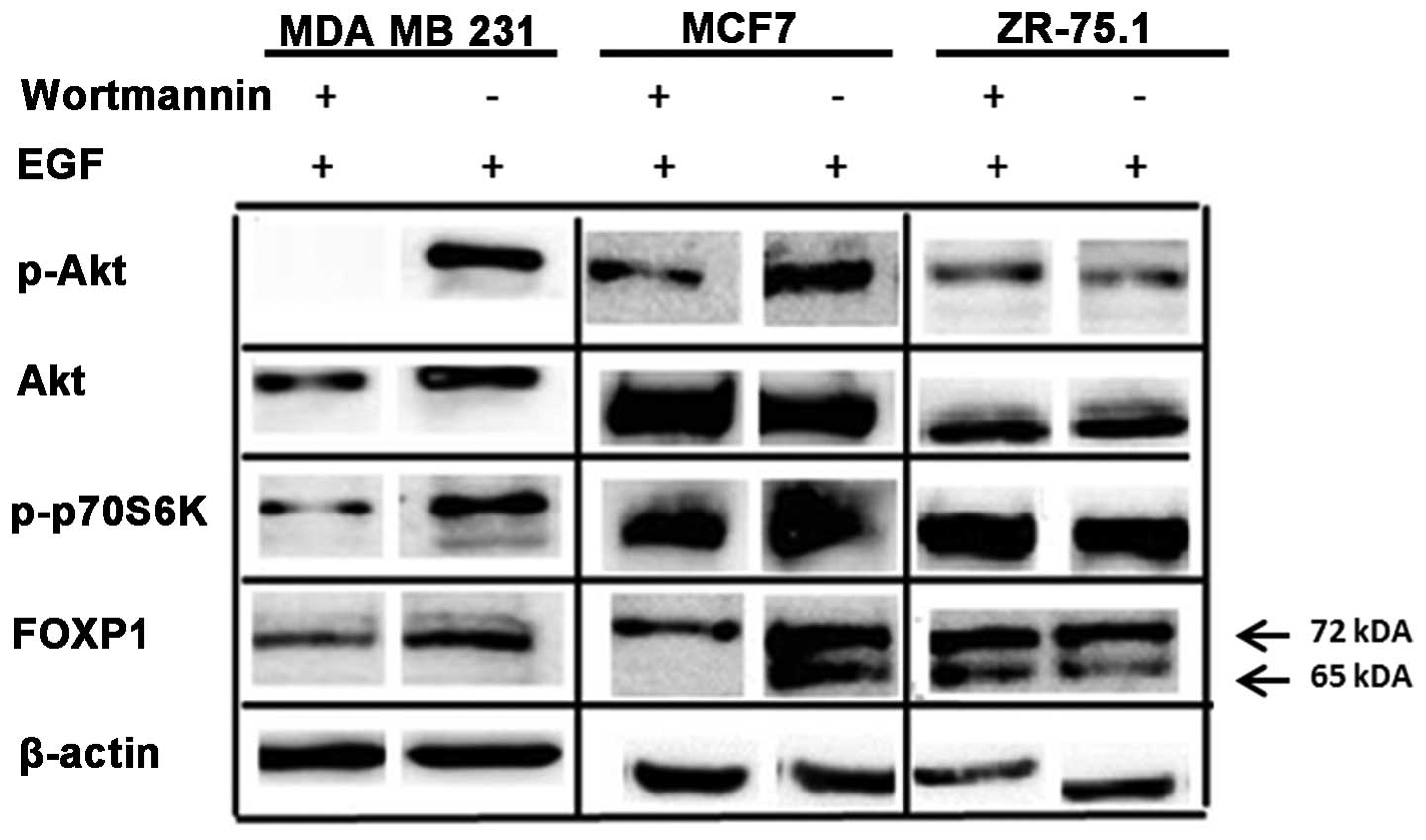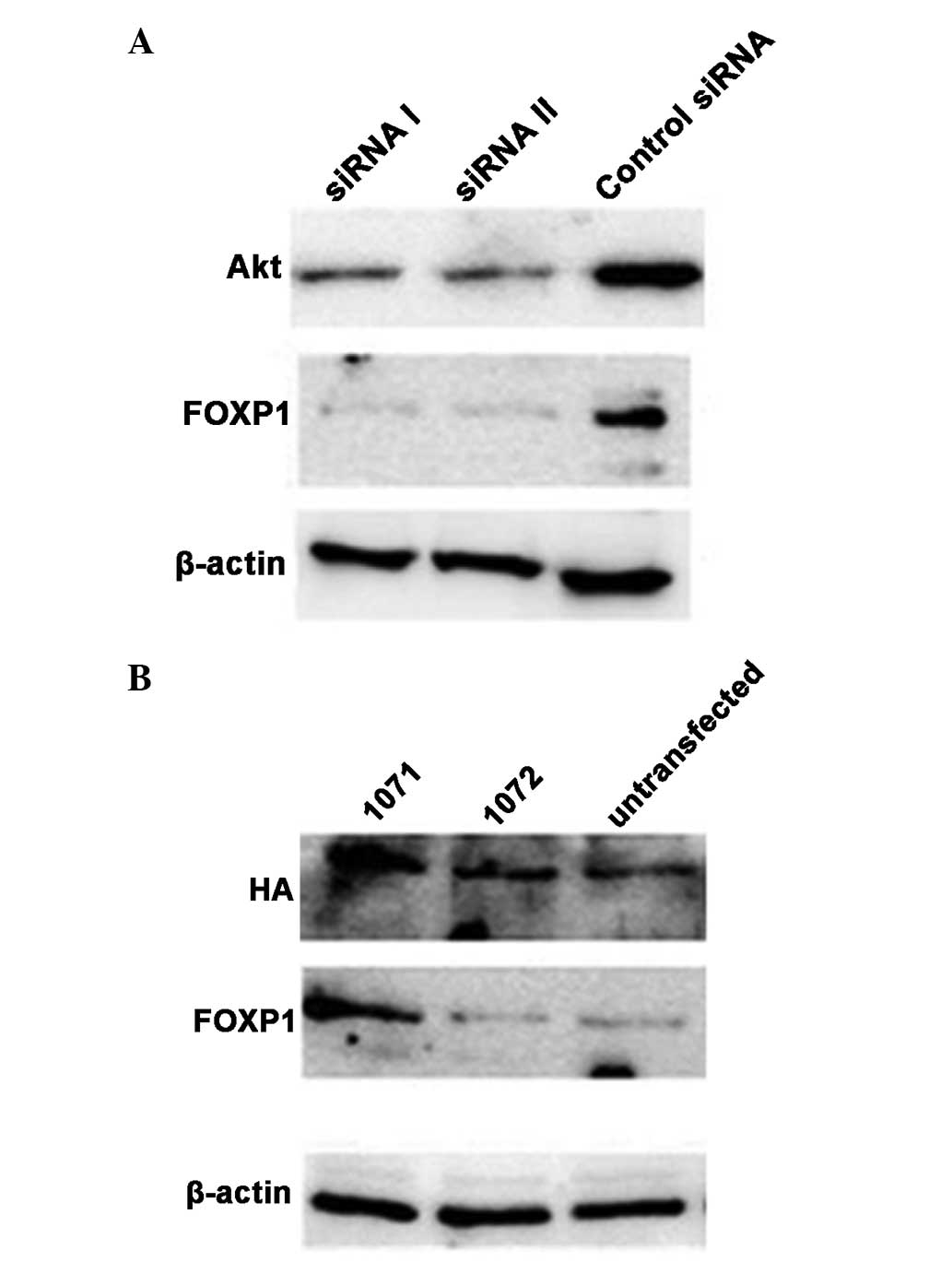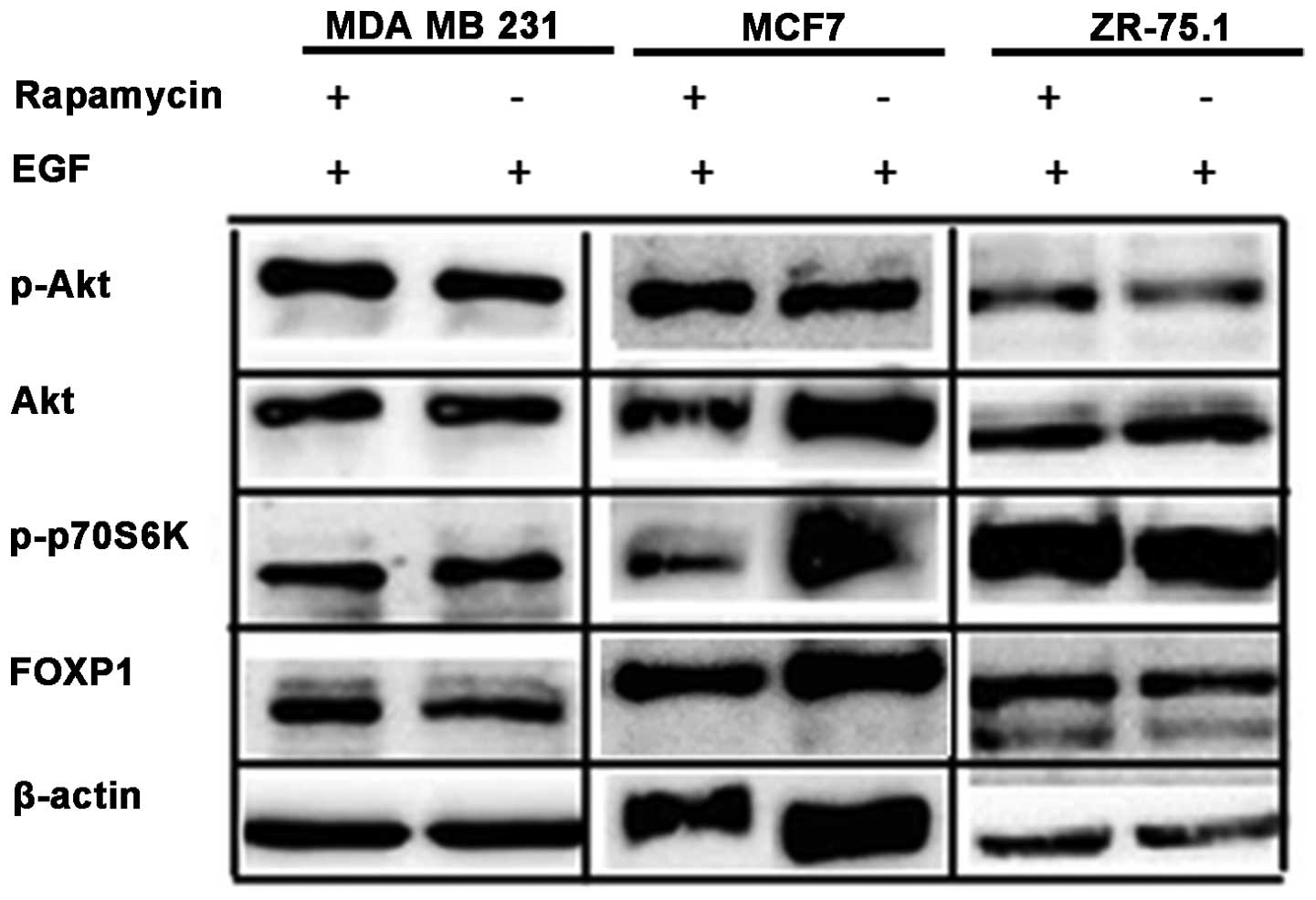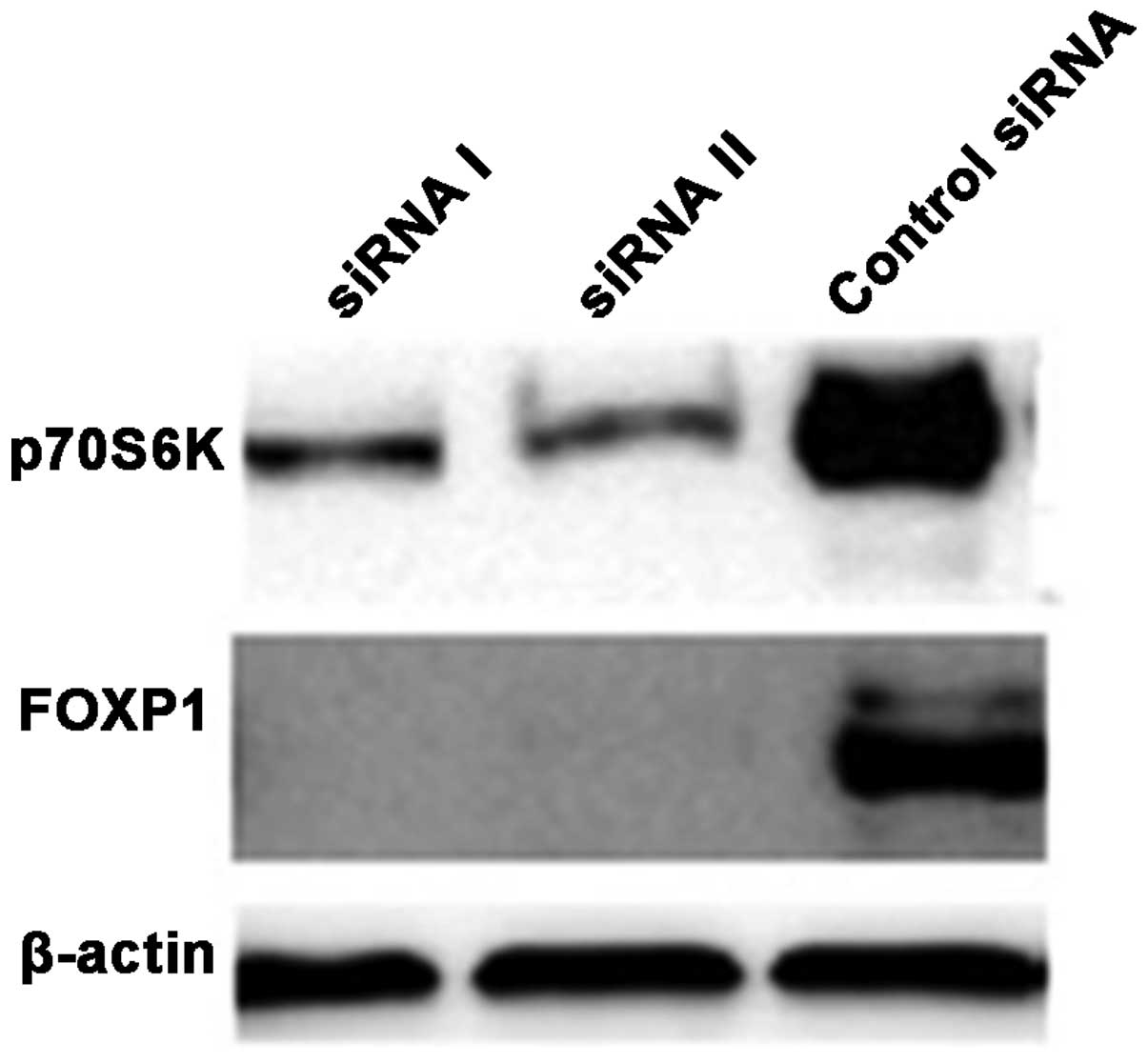|
1
|
Beelen K, Hoefnagel LD, Opdam M, et al:
PI3K/AKT/mTOR pathway activation in primary and corresponding
metastatic breast tumors after adjuvant endocrine therapy. Int J
Cancer. 135:1257–1263. 2014. View Article : Google Scholar : PubMed/NCBI
|
|
2
|
Zhang Y, Tseng CC, Tsai YL, et al: Cancer
cells resistant to therapy promote cell surface relocalization of
GRP78 which complexes with PI3K and enhances PI(3,4,5)P3
production. PLoS One. 8:e800712013. View Article : Google Scholar : PubMed/NCBI
|
|
3
|
Chin YR and Toker A: Akt isoform-specific
signaling in breast cancer: uncovering an anti-migratory role for
palladin. Cell Adh Migr. 5:211–214. 2011. View Article : Google Scholar : PubMed/NCBI
|
|
4
|
Shin S, Wolgamott L, Yu Y, et al: Glycogen
synthase kinase (GSK)-3 promotes p70 ribosomal protein S6 kinase
(p70S6K) activity and cell proliferation. Proc Natl Acad Sci USA.
108:E1204–E1213. 2011. View Article : Google Scholar : PubMed/NCBI
|
|
5
|
Matassa DS, Agliarulo I, Amoroso MR, et
al: TRAP1-dependent regulation of p70S6K is involved in the
attenuation of protein synthesis and cell migration: Relevance in
human colorectal tumors. Mol Oncol. 8:1482–1494. 2014. View Article : Google Scholar : PubMed/NCBI
|
|
6
|
Segatto I, Berton S, Sonego M, et al:
p70S6 kinase mediates breast cancer cell survival in response to
surgical wound fluid stimulation. Mol Oncol. 8:766–780. 2014.
View Article : Google Scholar : PubMed/NCBI
|
|
7
|
Plas DR and Thompson CB: Akt activation
promotes degradation of tuberin and FOXO3a via the proteasome. J
Biol Chem. 278:12361–12366. 2003. View Article : Google Scholar : PubMed/NCBI
|
|
8
|
Brunet A, Bonni A, Zigmond MJ, et al: Akt
promotes cell survival by phosphorylating and inhibiting a Forkhead
transcription factor. Cell. 96:857–868. 1999. View Article : Google Scholar : PubMed/NCBI
|
|
9
|
Biggs WH III, Meisenhelder J, Hunter T, et
al: Protein kinase B/Akt-mediated phosphorylation promotes nuclear
exclusion of the winged helix transcription factor FKHR1. Proc Natl
Acad Sci USA. 96:7421–7426. 1999. View Article : Google Scholar : PubMed/NCBI
|
|
10
|
van Boxtel R, Gomez-Puerto C, Mokry M, et
al: FOXP1 acts through a negative feedback loop to suppress
FOXO-induced apoptosis. Cell Death Differ. 20:1219–1229. 2013.
View Article : Google Scholar : PubMed/NCBI
|
|
11
|
Banham AH, Beasley N, Campo E, et al: The
FOXP1 winged helix transcription factor is a novel candidate tumor
suppressor gene on chromosome 3p. Cancer Res. 61:8820–8829.
2001.PubMed/NCBI
|
|
12
|
Brown PJ, Ashe SL, Leich E, et al:
Potentially oncogenic B-cell activation-induced smaller isoforms of
FOXP1 are highly expressed in the activated B cell-like subtype of
DLBCL. Blood. 111:2816–2824. 2008. View Article : Google Scholar
|
|
13
|
Bates GJ, Fox SB, Han C, et al: Expression
of the forkhead transcription factor FOXP1 is associated with that
of estrogen receptor-beta in primary invasive breast carcinomas.
Breast Cancer Res Treat. 111:453–459. 2008. View Article : Google Scholar
|
|
14
|
Shigekawa T, Ijichi N, Ikeda K, et al:
FOXP1, an estrogen-inducible transcription factor, modulates cell
proliferation in breast cancer cells and 5-year recurrence-free
survival of patients with tamoxifen-treated breast cancer. Horm
Cancer. 2:286–297. 2011. View Article : Google Scholar : PubMed/NCBI
|
|
15
|
Banham AH, Boddy J, Launchbury R, et al:
Expression of the forkhead transcription factor FOXP1 is associated
both with hypoxia inducible factors (HIFs) and the androgen
receptor in prostate cancer but is not directly regulated by
androgens or hypoxia. Prostate. 67:1091–1098. 2007. View Article : Google Scholar : PubMed/NCBI
|
|
16
|
Rayoo M, Yan M, Takano EA, et al:
Expression of the forkhead box transcription factor FOXP1 is
associated with oestrogen receptor alpha, oestrogen receptor beta
and improved survival in familial breast cancers. J Clin Pathol.
62:896–902. 2009. View Article : Google Scholar : PubMed/NCBI
|
|
17
|
McMahon LP, Yue W, Santen RJ and Lawrence
JC Jr: Farnesylthiosalicylic acid inhibits mammalian target of
rapamycin (mTOR) activity both in cells and in vitro by promoting
dissociation of the mTOR-raptor complex. Mol Endocrinol.
19:175–183. 2005. View Article : Google Scholar
|
|
18
|
Tiwary R, Yu W, Sanders BG and Kline K:
α-TEA cooperates with MEK or mTOR inhibitors to induce apoptosis
via targeting IRS/PI3K pathways. Br J Cancer. 104:101–109. 2011.
View Article : Google Scholar :
|
|
19
|
Carracedo A, Ma L, Teruya-Feldstein J, et
al: Inhibition of mTORC1 leads to MAPK pathway activation through a
PI3K-dependent feedback loop in human cancer. J Clin Invest.
118:3065–3074. 2008.PubMed/NCBI
|
|
20
|
Sangai T, Akcakanat A, Chen H, et al:
Biomarkers of response to Akt inhibitor MK-2206 in breast cancer.
Clin Cancer Res. 18:5816–5828. 2012. View Article : Google Scholar : PubMed/NCBI
|
|
21
|
Noh WC, Mondesire WH, Peng J, et al:
Determinants of rapamycin sensitivity in breast cancer cells. Clin
Cancer Res. 10:1013–1023. 2004. View Article : Google Scholar : PubMed/NCBI
|
|
22
|
Yellen P, Saqcena M, Salloum D, et al:
High-dose rapamycin induces apoptosis in human cancer cells by
dissociating mTOR complex 1 and suppressing phosphorylation of
4E-BP1. Cell Cycle. 10:3948–3956. 2011. View Article : Google Scholar : PubMed/NCBI
|
|
23
|
Chen Y, Zheng Y and Foster DA:
Phospholipase D confers rapamycin resistance in human breast cancer
cells. Oncogene. 22:3937–3942. 2003. View Article : Google Scholar : PubMed/NCBI
|
|
24
|
Meric-Bernstam F, Akcakanat A, Chen H, et
al: PIK3CA/PTEN mutations and Akt activation as markers of
sensitivity to allosteric mTOR inhibitors. Clin Cancer Res.
18:1777–1789. 2012. View Article : Google Scholar : PubMed/NCBI
|
|
25
|
O’Reilly KE, Rojo F, She QB, et al: mTOR
inhibition induces upstream receptor tyrosine kinase signaling and
activates Akt. Cancer Res. 66:1500–1508. 2006. View Article : Google Scholar
|
|
26
|
Breuleux M, Klopfenstein M, Stephan C, et
al: Increased AKT S473 phosphorylation after mTORC1 inhibition is
rictor dependent and does not predict tumor cell response to
PI3K/mTOR inhibition. Mol Cancer Ther. 8:742–753. 2009. View Article : Google Scholar : PubMed/NCBI
|
|
27
|
Holz MK and Blenis J: Identification of S6
kinase 1 as a novel mammalian target of rapamycin
(mTOR)-phosphorylating kinase. J Biol Chem. 280:26089–26093. 2005.
View Article : Google Scholar : PubMed/NCBI
|
|
28
|
Holz MK, Ballif BA, Gygi SP and Blenis J:
mTOR and S6K1 mediate assembly of the translation preinitiation
complex through dynamic protein interchange and ordered
phosphorylation events. Cell. 123:569–580. 2005. View Article : Google Scholar : PubMed/NCBI
|
|
29
|
Gomez GG, Volinia S, Croce CM, et al:
Suppression of microRNA-9 by mutant EGFR signaling upregulates
FOXP1 to enhance glioblastoma tumorigenicity. Cancer Res.
74:1429–1439. 2014. View Article : Google Scholar : PubMed/NCBI
|
|
30
|
Qin J, Xu Y, Li X, et al: Effects of
lentiviral-mediated Foxp1 and Foxq1 RNAi on the hepatocarcinoma
cell. Exp Mol Pathol. 96:1–8. 2014. View Article : Google Scholar
|
|
31
|
Feng J, Zhang X, Zhu H, et al: High
expression of FoxP1 is associated with improved survival in
patients with non-small cell lung cancer. Am J Clin Pathol.
138:230–235. 2012. View Article : Google Scholar : PubMed/NCBI
|
|
32
|
Krohn A, Seidel A, Burkhardt L, et al:
Recurrent deletion of 3p13 targets multiple tumour suppressor genes
and defines a distinct subgroup of aggressive ERG fusion-positive
prostate cancers. J Pathol. 231:130–141. 2013. View Article : Google Scholar : PubMed/NCBI
|


















